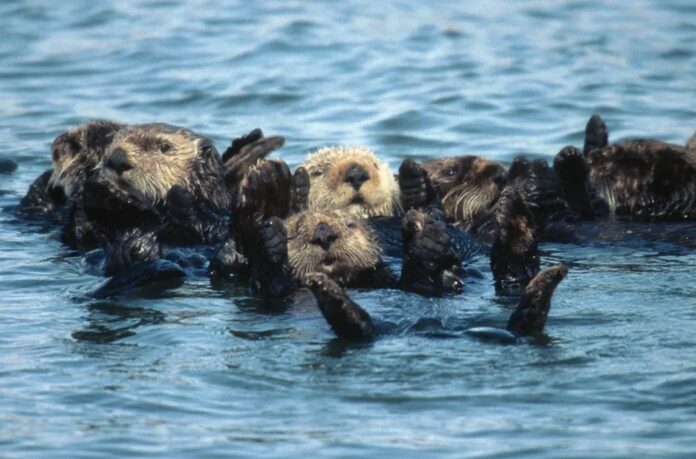The Department of Interior has let three Alaska Native organizations — Tlingit & Haida Central Council, Chugach Regional Resources Commission, and Kodiak Island Tribal Coalition — determine a brand new interpretation of tribal membership, as it relates to the hunting mammals like of sea otters under the Marine Mammal Protection Act.
The redefinition of tribal membership is not unlike how the Biden Administration tried to redefine “woman” to include “transgenders” under Title IX protection of women and girls’ sports. The U.S. Supreme Court has put that action on hold, while it is under appeal by states such as Alaska.
The details of the new interpretation of what it means to be a tribal member are technical, narrow, and involve an area of law with which most Americans are unfamiliar: The hunting of sea mammals, including polar bear, sea otters, and walrus.
“Alaskan Native means a person defined in the Alaska Native Claims Settlement Act (43 U.S.C. 1602(b)) (85 Stat. 588) as a citizen of the United States who is of one-fourth degree or more Alaska Indian (including Tsimshian Indians enrolled or not enrolled in the Metlakatla Indian Community), Eskimo, or Aleut blood or combination thereof. The term includes any Native, as so defined, either or both of whose adoptive parents are not Natives. It also includes, in the absence of proof of a minimum blood quantum, any citizen of the United States who is regarded as an Alaska Native by the Native village or group, of which he claims to be a member and whose father or mother is (or, if deceased, was) regarded as Native by any Native village or Native group,” the U.S. Fish and Wildlife Service says. (Our italicized emphasis).
“Absence of proof of a minimum blood quantum” and any citizen who is “regarded” as a member of a Native village or “group” is the key portion of the new definition that is of interest to Alaska Natives, who may see increased competition for subsistence resources.
In a letter to Tlingit & Haida Central Council President Richard Petersen, U.S. Fish and Wildlife said that “to minimize confusion for hunters and facilitate continued subsistence harvest and sharing of cultural traditions with all generations of Alaska Native peoples, the Service is clarifying that our existing regulations provide options for determining Alaska Native harvest eligibility for marine mammals under the Service’s jurisdiction (sea otters, walrus, and polar bears). Eligible hunters, who reside in Alaska on the coast of the North Pacific or Arctic Oceans, can now be simply admitted by a tribe:
1) “a citizen of the United States who is of one-fourth degree or more Alaska Indian (including Tsimshian Indians enrolled or not enrolled in the [Metlakatla] Indian Community), Eskimo, or Aleut blood, or combination thereof”; or
2) “in the absence of proof of a minimum blood quantum, any citizen of the United States who is regarded as an Alaska Native by the Native village or town of which [the hunter] claims to be a member and whose father or mother is (or, if deceased, was) regarded as a Native by any Native village or town”; or
3) “any citizen enrolled by the Secretary pursuant to section 5 of the Alaska Native Claims Settlement Act.”
A tribe can essentially open up membership, enroll people it wants using its own decision process, and then those people can hunt polar bear, walrus, or sea otters.
There is no consideration in the Fish and Wildlife ruling about what impact the addition of tribal members may have on the polar bears, walruses, or sea otter. And there’s no explanation given as to why this ruling would not trigger the National Environmental Policy Act (NEPA) process and require an environmental impact statement.
The issue is tribal sovereignty, according to the government and the three tribal governance coalitions. But the federal government has only been in consultation with three tribal governance coalitions, rather than the 227 other federally recognized tribes in Alaska.
What’s more, the National Oceanic and Atmospheric Administration (NOAA) has primacy on management of some ocean mammals, while U.S. Fish and Wildlife manages other marine mammals, which may create a conflict in how the agencies enforce the laws that protect a scarce resource. It’s unclear if NOAA is going to recognize the now-open tribal membership rules set by Fish and Wildlife. It’s also unclear if the tribes will be able to bulk up their memberships, and how they might monetize it.
The Marine Mammal Protection Act was designed to conserve marine mammals by prohibiting the “taking” of these species within U.S. waters, but hit has an exemption for Alaska Natives. The Alaska Native Exemption allows for the harvest of marine mammals, including sea otters, for subsistence purposes, as well as for the creation of handicrafts and clothing, provided that the harvest is done in a non-wasteful manner.
Under Section 119 of the Act, federal agencies are authorized to enter into cooperative agreements with Alaska Native organizations to jointly manage marine mammal populations and oversee subsistence uses by Native communities.
On Sept. 26, Fish and Wildlife officials held a consultation with representatives from Tlingit & Haida, CRRC, and KITC to discuss Alaska Native eligibility, traditional harvest practices, food security, and Section 119 co-management of sea otters. The federal agency also presented a legal clarification regarding the regulatory definition of “Alaska Native” from the U.S. Department of Interior Solicitor General, which could impact who is eligible to harvest marine mammals.
The letter from the Biden Administration’s Sara Boario, who is the Alaska regional director for Fish and Wildlife, follows:
